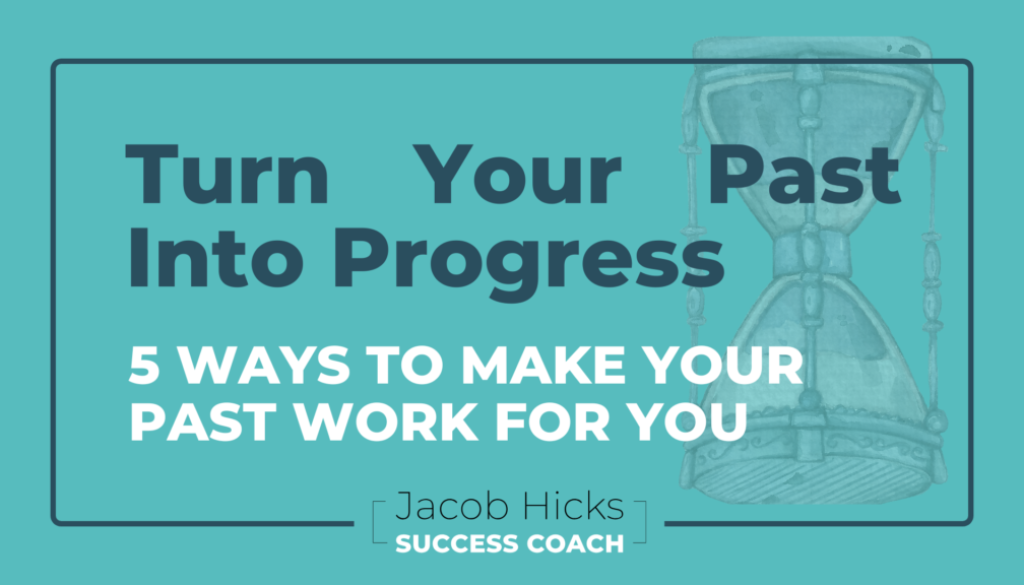Turn Your Past Into Progress
Life is a series of lessons. Each is wrapped in the experiences we live through. They all have something to teach us: the good, the bad, the ugly, and the downright extra aggravating (not just me, right?). But those lessons don’t just magically appear. We have to dig into those experiences, reflect on them, and uncover the insights they hold. You don’t just grow by learning from your past – you set yourself up for a brighter, more focused future. It doesn’t sound so bad, does it?
-
Your Past Is Your Teacher
Your past is like a personal textbook filled with lessons waiting to be learned. Each experience, whether a success or a challenge, holds the key to understanding what works, what doesn’t, and how you can grow. The trick is to step back and actually pay attention to what it’s trying to teach you.
Why This Is Important: Your past is like a personal textbook filled with lessons waiting to be learned. Each experience, whether a success or a challenge, holds the key to understanding what works, what doesn’t, and how you can grow. The trick is to step back and actually pay attention to what it’s trying to teach you.
What You Can Do: Your past is like a personal textbook filled with lessons waiting to be learned. Each experience, whether a success or a challenge, holds the key to understanding what works, what doesn’t, and how you can grow. The trick is to step back and actually pay attention to what it’s trying to teach you.
Sales Power Move: Your past is like a personal textbook filled with lessons waiting to be learned. Each experience, whether a success or a challenge, holds the key to understanding what works, what doesn’t, and how you can grow. The trick is to step back and actually pay attention to what it’s trying to teach you
2. Reframe Your “Failure” As Opportunities
Your past is like a personal textbook filled with lessons waiting to be learned. Each experience, whether a success or a challenge, holds the key to understanding what works, what doesn’t, and how you can grow. The trick is to step back and actually pay attention to what it’s trying to teach you.
Why This Is Important: Reframing failure builds resilience and confidence. According to research, those who can view setbacks as learning opportunities are better equipped to bounce back and stay motivated.
What You Can Do: Next time something doesn’t go as planned, ask yourself: “What can I take away from this?” Be specific. If a project falls apart, figure out what went wrong and how you can prevent it next time.
Sales Power Move: Lost a deal? Instead of dwelling on it, break it down. What could you have done differently? Did you wait too long to follow up? Did you miss a key objection? Use these insights to refine your sales game for the next opportunity.
3. Create Your Feedback Loop
Sometimes, we’re too close to a situation to see the whole picture. That’s where feedback comes in. Honest, constructive feedback from mentors, peers, or clients can provide insights we might miss.
Why This Is Important: Feedback helps you uncover blind spots and validate your progress. Studies from Harvard Business Review show that pairing reflection with feedback leads to faster personal and professional growth.
What You Can Do: Ask for feedback regularly. Be specific: “What’s one thing I could improve for next time?” And remember, it’s not personal—it’s about getting better.
Sales Power Move: Ask for feedback after a client meeting or pitch. It can be as simple as, “What stood out to you today?” or “How could I have made this process easier for you?” Their insights will help you fine-tune your approach and build stronger relationships.
4. Celebrate Your Growth, Not Perfection
Let’s face it: perfection is overrated. Progress is what matters. Celebrating your growth—even the small wins—builds confidence and reinforces positive behaviors.
Why This Is Important: Celebrating progress keeps you motivated and helps you focus on how far you’ve come instead of how far you have left to go. Research shows that this mindset shift leads to greater happiness and productivity.
What You Can Do: Create a “wins list” where you track your accomplishments, no matter how small. Finished a challenging project? Add it to the list. Did you land a big client? That goes on there too. Take time to revisit this list when you need a confidence boost.
Sales Power Move: Before a big pitch, revisit your wins list. Remind yourself of the deals you’ve closed, the relationships you’ve built, and the goals you’ve smashed. Confidence sells—bring that energy to your next call or meeting.
5. Apply Lessons To Your Future Goals
Reflection isn’t just about looking back—it’s about looking forward. Your past successes and failures are the blueprint for your future goals. By applying what you’ve learned, you can set smarter, more meaningful objectives.
Why This Is Important: You create a clear, actionable roadmap when you align your goals with your past experiences. Research highlights how this process increases focus and makes goals more attainable.
What You Can Do: At the start of each month, set goals based on your learning. Break them down into actionable steps and track your progress.
Sales Power Move: Use data from your past sales cycles to inform your targets for the next quarter. What worked? What didn’t? By building on your knowledge, you’ll stay ahead of the game and keep hitting your goals.
Reflection isn’t about getting stuck in the past—it’s about learning from it and using it to chart a better future. When you see your past as a teacher, reframe failures, seek feedback, celebrate progress, and apply lessons learned, you set yourself up for continuous growth.
Take 15 minutes today to reflect on a recent win or lesson. Ask yourself how it can guide your next step. Your future self will thank you for it.
